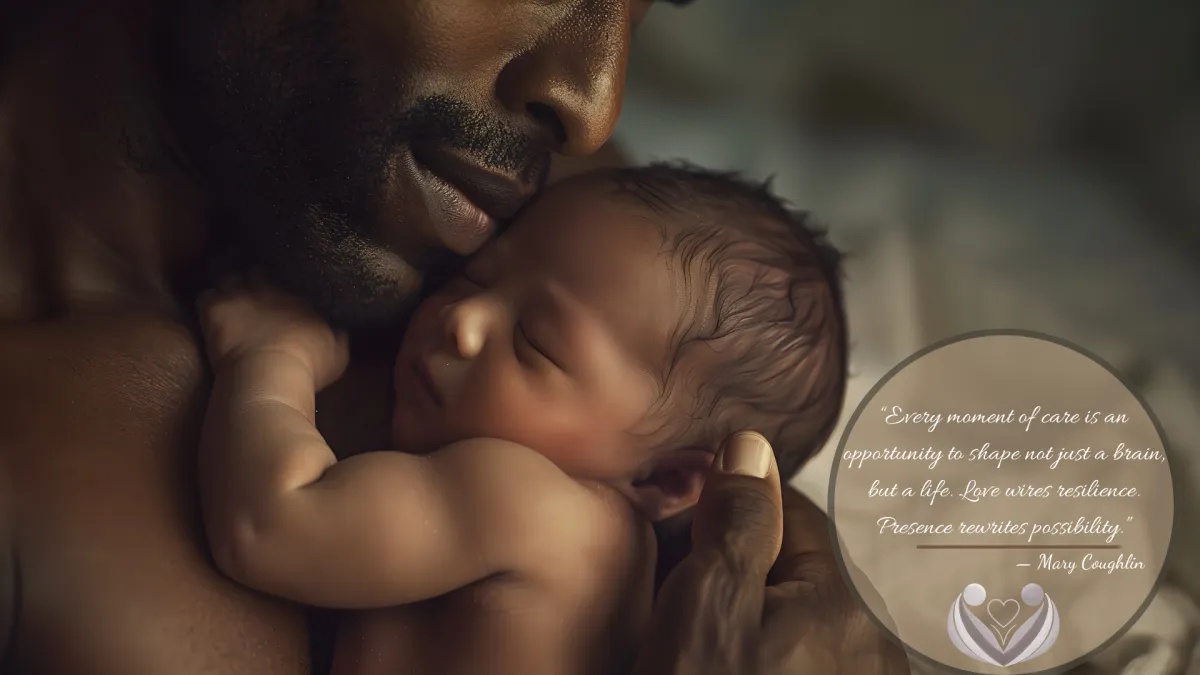
Wired by Love or Stress: How Early Experiences Shape the Infant Brain
“Every moment of care is an opportunity to shape not just a brain, but a life. Love wires resilience. Presence rewrites possibility.” — Mary Coughlin
Wired by Love or Stress: How Early Experiences Shape the Infant Brain
The Science: Structural Stability vs. Functional Fluidity
TIDC: Grounding Care in Developmental Protection and Emotional Safety
Caring Science: The Soul of Co-Regulation
The BUFFER Framework: Becoming the Buffer
What if the way we care for babies could shape their brain's blueprint for life?
That question is no longer philosophical—it’s biological. A 2022 study by Ciarrusta and colleagues has revealed something both awe-inspiring and urgent: in the first weeks of life, a baby’s brain is already forming a structural and functional “fingerprint.” And while the structural connections appear largely stable, it’s the functional wiring of the brain that tells a powerful story—one that is shaped, moment by moment, by experience.
In other words: what happens to babies matters. And what happens in the NICU may matter even more.
The Science: Structural Stability vs. Functional Fluidity
Ciarrusta et al. found that each baby has a unique pattern of physical brain connections (the structural connectome) that is relatively consistent even in the early postnatal period. But the functional connectome—how those brain areas work together in real time—was highly dynamic. It was changeable. It was being shaped.
The researchers describe this as "experience-dependent" development: the way an infant’s brain functions is directly influenced by what they are sensing, feeling, and experiencing in their environment.
In the sterile, overstimulating, and sometimes traumatic environment of the NICU, this has profound implications.
The NICU is Not Neutral
For preterm and medically fragile babies, the NICU is not a pause in development—it is the developmental environment. It is where the brain is being wired in real time. And while it can be a place of healing, it can also be a place of adversity: repeated painful procedures, maternal separation, exposure to bright lights and alarms, inconsistent touch and manipulation.
The functional connectome of a preterm baby doesn’t just reflect their biology. It reflects their experience.
This is where Trauma-Informed Developmental Care (TIDC) becomes a life-altering intervention.
TIDC: Grounding Care in Developmental Protection and Emotional Safety
TIDC is more than a clinical framework. It is a moral commitment to recognize the vulnerability of the developing brain and respond with presence, protection, and partnership.
Each of the five Core Measures of TIDC—from protected sleep to compassionate relationships—aims to shape a healing environment that supports the infant’s neurodevelopment. TIDC ensures that care is not just performed but offered in ways that minimize trauma, support regulation, and honor the human experience.
Caring Science: The Soul of Co-Regulation
Jean Watson's Caring Science reminds us that we are not just treating bodies—we are engaging souls. Intentional presence, healing touch, and the transmission of love are not sentimental gestures. They are neurobiological events.
When clinicians embody loving-kindness, equanimity, and sacred intention, they become powerful co-regulators. In a world of beeping monitors and clinical chaos, their steady presence can literally help organize the baby’s nervous system.
Science and soul are not opposites. They are companions in healing.
The BUFFER Framework: Becoming the Buffer
This is where the BUFFER framework becomes the bridge. It gives clinicians a practical pathway to operationalize both TIDC and Caring Science:
Belonging: affirming connection and inclusion for families and team members
Understanding: attuning to the needs behind behaviors
Forgiveness: letting go of blame and embracing compassion
Frameworks: using structured, trauma-informed approaches to care
Equanimity: remaining centered amidst stress and uncertainty
Respect: honoring the dignity of every person, including oneself
By becoming a BUFFER, the clinician becomes the interrupter of adversity and the activator of resilience.
Wired by Love or Stress: What Will We Choose?
The findings from Ciarrusta et al. offer a stunning reminder: the infant brain is not just growing—it is being shaped. The NICU is not just a place of survival—it is a place of becoming.
Will we wire babies for stress? Or will we wire them for love, safety, and connection?
If we choose the latter, we must commit to trauma-informed, relational, and compassionate care. We must embrace science, soul, and skill as inseparable partners in the work of healing.
Let us remember: in every moment of care, we are shaping more than outcomes. We are shaping lives.
Reflect + Respond
How might your NICU environment shape the functional connectome of the babies in your care?
In what ways can you act as a BUFFER today?
Who might you invite into this conversation to spark change?
I’d love to hear your reflections. Share your thoughts or tag a colleague who’s part of the movement to reimagine neonatal care.
With you in this sacred work of shaping hearts, healing systems,
Mary
P.S.: If this message speaks to your heart, there are two beautiful ways to go deeper:
Join us for The Power of Presence workshop to reconnect with the healing potential of intention, attunement, and co-regulation—or take the next step on your journey by becoming a certified Trauma-Informed Professional (TIP), where science, soul, and skill come together to transform care from the inside out.
🌿 Explore the Presence Workshop
🌀 Discover the TIP 2.0 Certification
#CaringIsEssential #TraumaInformedCare #TIDC #BUFFER #ScienceSoulSkill
